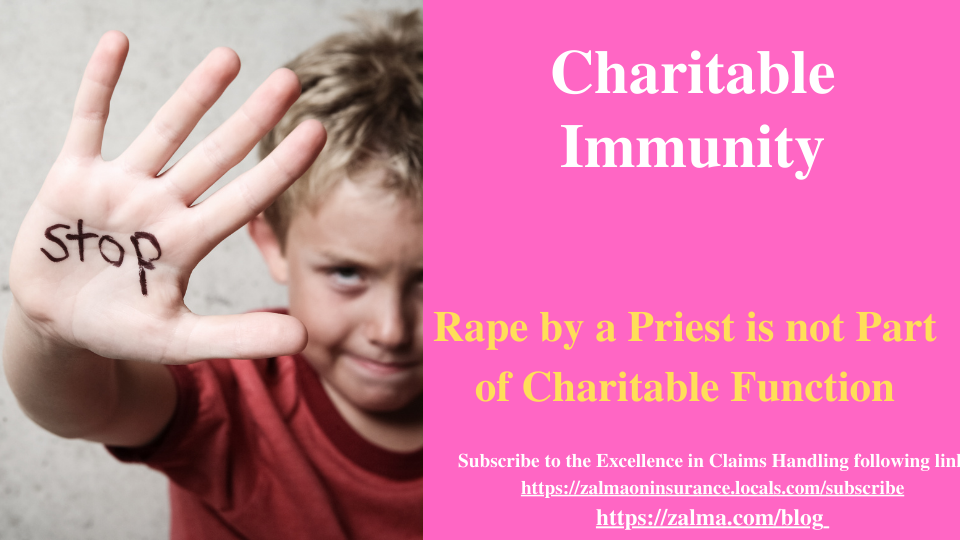Charitable Immunity

Charitable Immunity
Read the full article at https://lnkd.in/guhz_Uui and at https://zalma.com/blog plus more than 4250 posts and
See the full video at https://lnkd.in/grm4kUin and at https://lnkd.in/g4fkYiHM
Rape by a Priest is not Part of Charitable Function
The plaintiff sued the Roman Catholic Bishop of Springfield, a corporation sole (Roman Catholic Bishop of Springfield), and church officials for the sexual abuse by church leadership that he allegedly endured as a child in the 1960s and for the church’s handling of his complaint beginning in 2014.
In John Doe v. Roman Catholic Bishop Of Springfield & others, No. SJC-13219 (July 28, 2022) the defendants moved to dismiss the complaint on the grounds of common-law charitable immunity and the doctrine of church autonomy, the latter of which is derived largely from the religion clauses of the First Amendment to the United States Constitution.
BACKGROUND
In the 1960s, when the plaintiff was approximately nine to eleven years old he was abused sexually by multiple church officials, including a priest at the parish, the pastor of the parish, and then Roman Catholic Bishop of Springfield Christopher J. Weldon. The abuse included “severe anal penetration” and occurred in a rectory bedroom and a building adjacent to the parish. Weldon allegedly dragged the plaintiff into the room, where at least one other altar boy and two priests were present, and commanded one of the altar boys or priests to get the plaintiff onto the bed. The altar boys and priests grabbed the plaintiff, flipped him onto his stomach, and pinned him to the bed while Weldon and others “brutally raped” him.
DISCUSSION
An erroneous denial of immunity from suit cannot, by definition, be remedied after the party asserting the immunity already has litigated the matter to final judgment. And immunity from suit always is considered collateral to the underlying litigation.
Common-Law Charitable Immunity
Common-law charitable immunity was abolished by the Legislature in 1971. Nonetheless, common-law charitable immunity applies to counts one through seven in this case because those counts describe conduct that allegedly occurred in the 1960s, and the abolishment of charitable immunity by the Legislature was prospective.
ZALMA OPINION
Regardless of the egregious abuse perpetrated on the Plaintiff the defendants properly asserted immunity for parts of the suit since they involved the charitable function of the Church while the rape of a young boy by high members of the church had absolutely nothing to do with its charitable function and provides an example why the state did away with the immunity.
(c) 2022 Barry Zalma & ClaimSchool, Inc.
Barry Zalma, Esq., CFE, is available t http://www.zalma.com and [email protected].
We are 100% funded for October.
Thanks to everyone who helped out. 🥰
Xephula monthly operating expenses for 2024 - Server: $143/month - Backup Software: $6/month - Object Storage: $6/month - SMTP Service: $10/month - Stripe Processing Fees: ~$10/month - Total: $175/month
- Art
- Causes
- Crafts
- Crime
- Dance
- Drinks
- Film
- Finance
- Fitness
- Food
- Juegos
- Gardening
- Health
- Home
- Literature
- Music
- Networking
- Paranormal
- Other
- Politics
- Directorio
- News
- Party
- Science
- Religion
- Shopping
- Sports
- SyFy
- Politically Incorrect
- Philosophy
- Theater
- Technology
- Wellness



